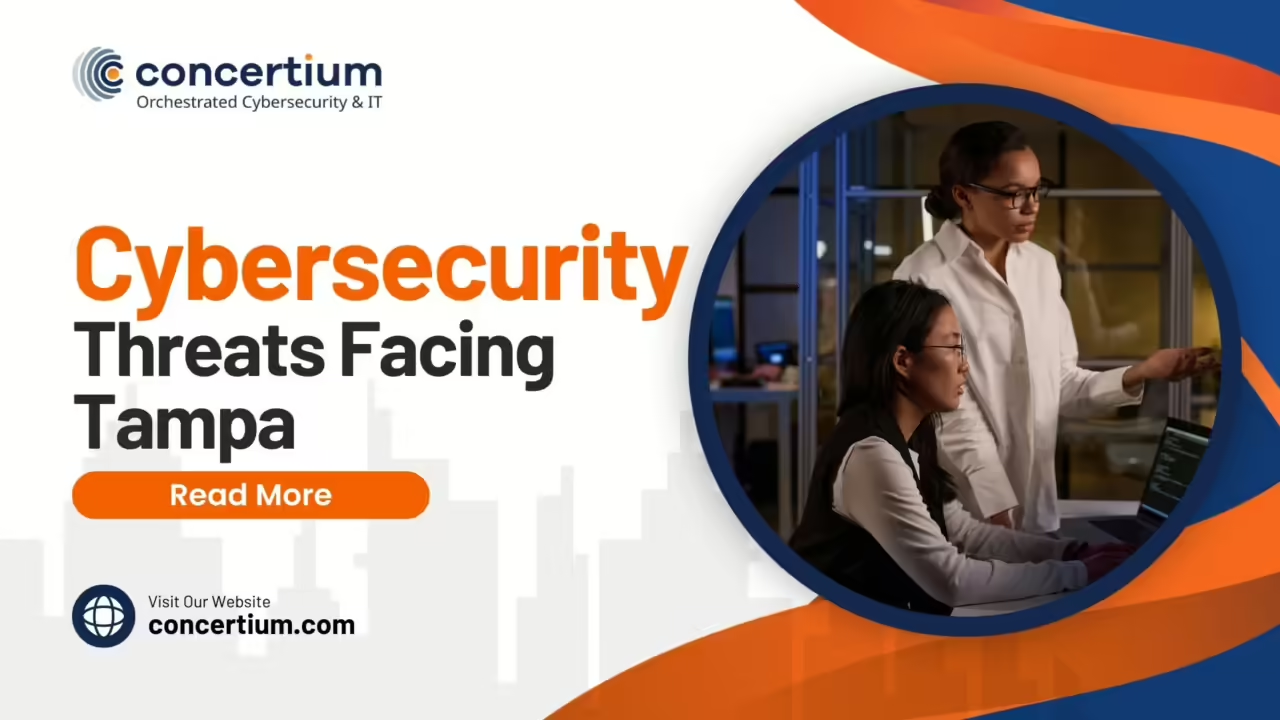Cybersecurity Threats Facing Tampa
Cybersecurity is crucial for Tampa’s thriving economy and digital infrastructure. As more businesses and individuals go online, the risk of cyber threats escalates. In recent years, Tampa has seen a surge in cyber attacks, affecting various sectors from healthcare to finance. Therefore, understanding these threats is more important than ever.
The number of cyber incidents has grown significantly, with attackers becoming more sophisticated. Phishing, ransomware, and malware attacks are on the rise. Tampa Bay businesses and residents must stay informed and vigilant to protect their data and assets.
The purpose of this article is to shed light on the top cybersecurity threats facing Tampa in 2024. We will delve into each threat, providing examples and prevention tips. By the end, you’ll be equipped with the knowledge to safeguard your digital environment.
Cybersecurity in Tampa
The current state of cybersecurity in Tampa is a mixed bag. On one hand, awareness is growing, and many businesses are implementing robust security measures. On the other hand, the increasing digital footprint makes Tampa an attractive target for cybercriminals.
Key industries, including healthcare, finance, and retail, are particularly vulnerable. These sectors handle vast amounts of sensitive data, making them prime targets for attacks. For instance, a data breach in a healthcare facility could expose patient records, leading to severe consequences.
The importance of cybersecurity measures cannot be overstated. Regular updates, employee training, and robust security protocols are essential. Above all, a proactive approach can significantly reduce the risk of incidents. By staying informed and prepared, Tampa can build a resilient defense against cyber threats.
Phishing Attacks
Phishing attacks involve tricking individuals into revealing sensitive information, such as passwords and credit card numbers. These attacks often come through emails, appearing to be from trusted sources. However, they are sophisticated scams designed to steal your data.
Recent examples in Tampa highlight the prevalence of phishing. For instance, several local businesses reported phishing emails that mimicked legitimate communications. Employees, thinking they were real, clicked on malicious links, leading to data breaches. Preventing Phishing Attacks is crucial for safeguarding sensitive information.
Phishing attacks impact both businesses and individuals. For businesses, a successful phishing attack can lead to significant financial losses and reputational damage. Individuals may face identity theft and financial fraud. Therefore, it is essential to educate everyone on recognizing phishing attempts and implementing strong email filters.
To protect against phishing, be wary of unsolicited emails and verify the sender’s identity. Never click on suspicious links or provide personal information without confirming the legitimacy of the request. By staying vigilant, you can reduce the risk of falling victim to these malicious schemes.
Ransomware Attacks
Ransomware attacks involve hackers encrypting a victim’s data and demanding a ransom to unlock it. This type of attack has become increasingly common and sophisticated, causing significant disruption.
High-profile ransomware incidents have targeted various Tampa businesses. For example, a local hospital experienced a ransomware attack that crippled its systems, forcing it to divert patients and causing significant financial loss. Understanding Ransomware is essential for any organization relying on digital infrastructure.
The consequences of ransomware attacks on local businesses are severe. Operations can grind to a halt, and the cost of paying the ransom or recovering data can be astronomical. In addition, the reputational damage can be long-lasting, affecting customer trust and future business opportunities.
To mitigate the risk of ransomware, businesses should regularly back up data and keep systems updated. Employee training is crucial to recognize phishing attempts that often deliver ransomware. Implementing robust security measures, such as firewalls and anti-malware software, can also help protect against these attacks.
Malware Infections
Malware infections involve malicious software designed to harm or exploit any programmable device or network. There are various types of malware, including viruses, worms, and spyware. These can steal data, damage systems, and disrupt operations.
Statistics show a significant rise in malware infections in Tampa. According to recent reports, businesses in the area have experienced a 20% increase in malware attacks over the past year. This trend highlights the growing threat and the need for effective cybersecurity measures.
The impact of malware on both individuals and organizations can be devastating. For individuals, malware can lead to identity theft and financial loss. Organizations may face operational disruptions, data breaches, and financial damage. Therefore, it’s crucial to use anti-malware tools, keep software updated, and practice safe browsing habits.
By understanding the nature of these threats and taking proactive measures, Tampa can better protect itself against the growing menace of malware infections.
Insider Threats
Insider threats originate from within an organization. Employees, contractors, or business associates misuse their access to harm the company. Examples include data theft, sabotage, or leaking sensitive information.
In Tampa, there have been notable insider threat cases. For instance, a former employee at a local healthcare provider was found guilty of selling patient records. This incident exposed 1.2 million patients’ medical records, causing severe reputational damage.
Mitigating insider threats requires robust internal security measures. Implement two-factor authentication, regularly update passwords, and monitor user activities. Conducting periodic security audits can also identify potential vulnerabilities. Above all, educating employees about the importance of data security and the consequences of breaches can significantly reduce these threats.
Data Breaches
A data breach occurs when unauthorized individuals gain access to sensitive data. This can happen through hacking, phishing, or insider threats.
Notable data breaches have impacted Tampa businesses significantly. For instance, in 2023, a major retailer suffered a breach, exposing customer information and social security numbers. This incident affected more than a million people and led to severe financial and reputational losses.
The long-term effects of data breaches are profound. Businesses face legal penalties, loss of customer trust, and potential bankruptcy. Therefore, it is crucial to implement strong cybersecurity measures, such as encryption and regular security updates, to prevent unauthorized access.
Distributed Denial of Service (DDoS) Attacks
DDoS attacks overwhelm a network with excessive traffic, causing it to crash. This disrupts business operations and can lead to significant financial losses.
Tampa has experienced several DDoS attacks. For example, a local bank faced a DDoS attack that rendered its online services unavailable for hours, affecting thousands of customers.
Businesses can protect themselves from DDoS attacks by implementing robust cybersecurity infrastructure. Using firewalls, intrusion detection systems, and having a response plan in place are essential steps. Additionally, staying up to date with the latest security practices can help mitigate these risks.
Social Engineering
Social engineering involves manipulating individuals to divulge confidential information. Types include phishing, pretexting, and baiting.
Recent instances in Tampa highlight the prevalence of social engineering attacks. For example, a hacker gained access to a company’s sensitive data by pretending to be a senior executive. This led to significant data theft and financial losses.
Preventive measures against social engineering include educating employees on recognizing suspicious activities and verifying the identity of requesters before sharing information. Implementing two-factor authentication and regularly updating security protocols can also reduce the risk of these attacks.
IoT Vulnerabilities
IoT vulnerabilities refer to security weaknesses in Internet of Things devices. These vulnerabilities can be exploited by attackers to gain unauthorized access to networks.
The impact of IoT vulnerabilities on Tampa’s infrastructure is significant. For instance, a cyberattack on connected city infrastructure could disrupt essential services, such as traffic management and utilities.
Best practices for securing IoT devices include regular software updates, strong password policies, and network segmentation. Ensuring that devices are configured with security in mind can also prevent unauthorized access and potential attacks.
Cloud Security Threats
Cloud security threats involve risks associated with storing and accessing data over the internet. These threats include data breaches, account hijacking, and insecure APIs.
Businesses in Tampa using cloud services face specific threats. For instance, misconfigured cloud settings can expose sensitive data to unauthorized users, leading to breaches.
To enhance cloud security, businesses should implement encryption, regular security audits, and access controls. Educating employees about secure cloud practices can also reduce the risk of breaches.
Emerging Cybersecurity Threats in 2024
New and evolving threats are predicted for 2024. These include advanced ransomware, AI-powered attacks, and deepfake scams.
The impact of these emerging threats on Tampa’s cybersecurity landscape is significant. Businesses and individuals must stay informed and proactive to combat these sophisticated attacks. For example, AI-powered attacks can bypass traditional security measures, making detection and prevention more challenging.
Recommendations for staying ahead of these threats include investing in advanced cybersecurity technologies, such as AI-driven security systems. Regular training and awareness programs for employees are also essential. Furthermore, collaborating with cybersecurity experts and staying updated with the latest trends can help organizations develop robust defenses.
Conclusion
Addressing cybersecurity threats is paramount for Tampa’s digital safety. Proactive measures, such as regular updates, employee training, and strong security protocols, are essential. Continuous vigilance and education can help businesses and individuals stay protected against evolving threats. By staying informed and implementing robust defenses, Tampa can build a resilient cybersecurity landscape.





